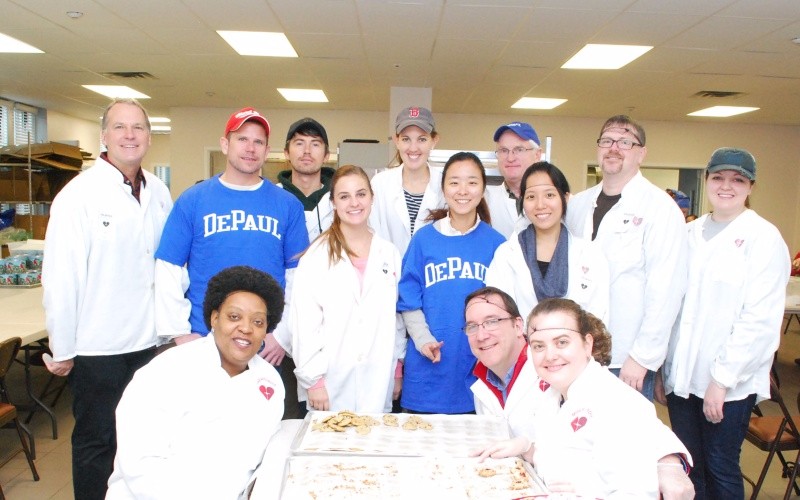Students in DePaul University's full-time MBA program are engaged in a new long-term community service project that marries DePaul's values with the heartfelt mission of a local non-profit, Misericordia. In this new initiative, students get real-world consulting experience by working with Misericordia leaders throughout the year to improve their operations and ultimately develop a business plan that can be easily implemented by the organization.
 Public service is at the heart of DePaul's values and has traditionally been a part of an education at the university. At the Kellstadt Graduate School of Business over the past six years, MBA students have travelled to New Orleans during weeklong holiday breaks to apply their business knowledge toward helping small businesses rebuild in the aftermath of Hurricane Katrina.
Public service is at the heart of DePaul's values and has traditionally been a part of an education at the university. At the Kellstadt Graduate School of Business over the past six years, MBA students have travelled to New Orleans during weeklong holiday breaks to apply their business knowledge toward helping small businesses rebuild in the aftermath of Hurricane Katrina.
"This year we wanted to challenge the students with a longer service project," says Bill Coughlin, associate director of graduate admissions at Kellstadt. "One of our goals was to make service — and giving back to the community — a more central part of the MBA experience for the students."
A Consulting Service with Heart
With assistance from DePaul's Steans Center for Community-based Service Learning and University Ministry, the Kellstadt office was connected with the local nonprofit Misericordia through their Chief Financial Officer Kevin Connelly, a 2001 DePaul MBA graduate. He is one of a quartet of leaders at Misericordia who have connections to DePaul through degrees or other associations.
Misericordia (Latin for hearts of mercy) is a 31-acre "community of care" center in Rogers Park on the North Side of Chicago. The mission of Misericordia is to support individuals with developmental disabilities in maximizing their level of independence and self-determination. Misericordia was founded by Sister Rosemary Connelly (Kevin's aunt), who is still an active leader in the organization today and also has been named by Chicago Magazine as one of its Chicagoans of the Year 2014.
There are more than 600 children and adults who live on the Misericordia campus. Misericordia believes that all people (disabled or not) should become meaningful member of their community. To that end, they provide residents with speech, occupational and physical therapies, as well as recreational activities and community interactions. There's an aquatic and fitness center, as well as a bakery and restaurant that employ some of the residents. Some residents work at Chicago businesses, while other businesses outsource projects to be performed on Miseracordia's campus.
"At DePaul, we would like to graduate students who will change the world in a positive way," says Coughlin. "Misericordia is a wonderful, locally based nonprofit with a great mission, which also has a need for consultation on several projects that require a business student's knowledge. It is a great overall fit for our students."
To kick off the service project, the students in the cohort travelled to Chicago's North Side where they were given a tour of the entire Misericordia campus. They met with Sister Rosemary and viewed a presentation on the history, mission and goals of the organization. They met several of the residents and got to see how the organization runs its operations.
"DePaul's approach (to the service project) is different," says Kevin Connelly. "It is built into the cohort MBA program and lasts the entire year. Other schools we have worked with typically provide a week's worth of service. At DePaul, it is taken seriously by all students and faculty, and there is a greater sense of dedication and care for the long-term results. Sister Rosemary was very enthusiastic about the commitment of a full school year to the projects."
Connelly has proposed that the MBA students address Misericordia's business needs in three different areas; in the recruitment and retention areas of human resources; the social media side of marketing; and how to run both the bakery and restaurant businesses more smoothly. Students divided themselves into teams to tackle each of these business needs and selected leaders who would be the main contacts for the organization and DePaul.
Real-World Experience in a Nonprofit Environment
It was up to the student groups to plan their visits to Misericordia and meet with the respective business units on their own time. The student groups also volunteered at the organization in December to get first-hand experience with its operations.
Tanner Krause, an MBA student studying change leadership, is the student leader for the project focused on the Greenhouse Inn, a full-service restaurant on the Misericordia campus that employs a few of its residents. He is familiar with the Miseracordia having played soccer with several of the residents when he was pursuing his undergraduate degree at Loyola University a few blocks away from Misericordia's campus.
"Certainly we've got a great opportunity to get consulting experience, understand nonprofit organizations and hopefully grow competencies around all," says Krause. "It's a great experience any time you get open access to a company's operations and are given the ability to collect and deliver feedback to the organization."
Krause and his team travelled to the restaurant on several occasions to study the business model, identify areas that can be improved and to enjoy a good meal. What gets Krause excited about the project is being able to provide his knowledge of business to a local nonprofit. Professional development, he notes, is a secondary benefit to helping out a great organization.
"I love the pairing of DePaul and Misericordia," continues Krause. "I think it's great that Kellstadt gives us the opportunity to give back to a group of Chicagoans in need. You've got two longtime institutions based on faith, hoping for the betterment of each of their constituents' lives."
Learn more about DePaul's Full-Time MBA Program.